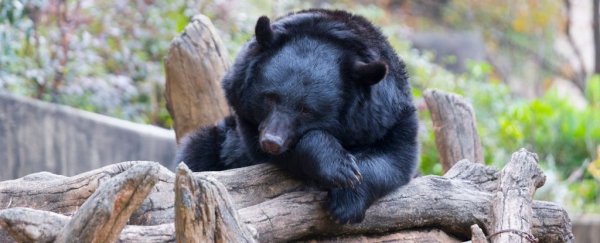There's something curious in the blood of black bears that allows them to hibernate for seven months a year while still remaining fit and healthy.
Scientists aren't sure what that something is, but a new study has helped close in on the mystery.
If we humans tried to lie dormant for as long as a black bear, our muscles would begin wasting away from the sheer lack of physical activity. But when a bear emerges from its den at the start of spring, it stretches out a lean and strong body.
The creature's muscle mass and strength are largely maintained from the year before, despite little to no movement, not even to drink or eat, poop or pee.
For years now, scientists have been trying to figure out how this superpower works, and a new study suggests the solutes in bear blood are key. They could even help prevent human muscle from atrophying.
That might sound crazy at first, but when researchers in Japan took a serum of blood from seven hibernating bears and added it directly to tissue cultures made of human skeletal muscle cells, they noticed a boost to the cells' protein content within 24 hours.
At the same time, there was a decrease in the production of a regulatory protein that plays a critical role in the shedding of unused muscles.
These cellular changes, however, were only seen when hibernating blood was added. When blood was taken from active black bears in the summertime, the serum did not stop the natural process of protein degradation in human skeletal muscle cells.
"We have indicated that 'some factor' present in hibernating bear serum may regulate protein metabolism in cultured human skeletal muscle cells and contribute to the maintenance of muscle mass," concludes physiologist Mitsunori Miyazaki from Hiroshima University.
"However, the identification of this 'factor' has not yet been achieved."
Similar studies have been done with black bear serum in the past, but none has managed to pinpoint the exact 'factor' driving the superpower. In 2018, serum from hibernating bears produced a reduction in protein turnover in human skeletal muscular tissue.
A similar effect has also been shown in skeletal muscle tissue from rats.
For now, that's about all we know, but Miyazaki is determined to keep searching for answers.
"By identifying this 'factor' in hibernating bear serum and clarifying the unexplored mechanism behind 'muscles that do not weaken even without use' in hibernating animals, it is possible to develop effective rehabilitation strategies in humans and prevent becoming bedridden in the future," he says.
The study was published in PLOS One.
